Showing 1-20 of 58 results
Climate Grief: Acknowledging Stress Helps Farmers Stay Resilient
Climate grief is personal to Maud Powell, associate professor and small farm advisor with Oregon State University. She and her husband vowed they’d never leave the land they loved and farmed for decades in Applegate Valley in southern Oregon. During the hot summers they survived using innovative water-saving techniques she shared with other farmers, like […]
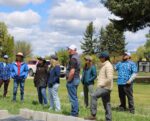 western.sare.org news exploring-montana-agriculture
western.sare.org news exploring-montana-agriculture Exploring Montana Agriculture
The SARE Fellows trip to Montana was amazing. I enjoyed seeing the collaborative efforts among the various farms and organizations to share their knowledge, expertise, and resources to help each other thrive while meeting the needs of the community. This experience has shown me how people working together is what truly makes programs sustainable. – […]
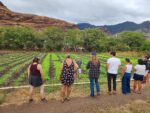 western.sare.org news building-bridges-across-the-pacific
western.sare.org news building-bridges-across-the-pacific Building Bridges Across the Pacific
Collaboration, education, and community empowerment hold potential for driving positive change. Accordingly, Regional Food Business Centers in Hawaiian, Pacific Island, and Alaskan communities are harnessing their skills and resources to reach their shared vision of resilient, sustainable, and self-reliant local food systems. Geographic isolation, food transit logistics, large Indigenous populations, underdeveloped infrastructure, extreme climate change […]
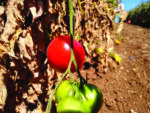 western.sare.org news rediscovering-dry-farming
western.sare.org news rediscovering-dry-farming Rediscovering Dry Farming
Climate change poses a serious challenge to Western farmers. How do you grow crops profitably when rainfall and drought are becoming so unpredictable and extreme? For many producers, dry farming may offer a way forward. Instead of relying on surface irrigation throughout the summer, dry farmers are finding ways to capture water from winter rains […]
Western SARE Funds Over $7.7 million in 2024
Western SARE’s Administrative Council has approved $7,765,941 for 82 projects throughout our region. Projects under seven different programs were funded: “Unlike the larger USDA grants programs, Western SARE provides support for small to moderate sized family farms and ag marketing enterprises, says Regional Coordinator Clayton Marlow. “ A quick glance at the 2025 funded projects […]
Promoting Water Recycling in Nurseries
One way to use water more efficiently is to use it twice. That’s the idea behind a Professional Development Project grant in Utah to promote water recycling in the state’s nursery industry. “I came here from Michigan and it’s a common practice to recycle water in nurseries there and on the eastern seaboard,” explained Utah […]
Farming and Food Narrative Project
Farmers know farming is a complex endeavor with competing demands and economic pressures. The non-farming public thinks farming is hard labor but otherwise simple. Farmers know that crop-destroying pests take the form of insects, diseases, weeds, nematodes, birds and mammals, and that managing pests requires an array of integrated tactics. The non-farming public thinks pests […]
Seeing Western Ag Issues in Every Grant Proposal
The most important function Western SARE performs is providing grant funding to support agriculture and rural communities in the American West. The importance of that financial support – to university researchers, Extension professionals and farmers and ranchers looking to improve their own operations and help their neighbors – cannot be overstated. The numbers bear that […]
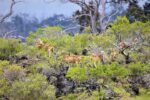 western.sare.org news ungulates-hawaiis-hooved-problem
western.sare.org news ungulates-hawaiis-hooved-problem Ungulates: Hawaii’s Hooved Problem
Hooved mammals – ungulates in scientific parlance – aren’t native to the archipelago but have been brought to the islands over the past centuries. Now, population explosions of wild pigs, feral sheep and goats, big-horned mouflon sheep and axis and black-tailed deer are altering ecosystems, affecting fisheries, imperiling agriculture and causing economic harm. “If you […]
 western.sare.org news using-less-water-by-stacking-conservation-practices
western.sare.org news using-less-water-by-stacking-conservation-practices Using Less Water by "Stacking" Conservation Practices
There’s a reason so many of the climate-related projects funded by Western SARE focus on water. “In Utah and much of the West, water scarcity is the number one issue when it comes to the future of agriculture,” explained Matt Yost, an Agroclimate Extension Specialist at Utah State University. “The pressure on water systems is […]
Climate Forums Produce Call to Actions in Pacific Islands
Pacific Island residents face strong and immediate threats from climate change, given that they live on low-lying atolls or islands in a period of rising sea levels. The islands are responsible for very little of the globe’s greenhouse emissions but are facing the direct impact of climate warming. To adapt to these changing conditions farmers […]
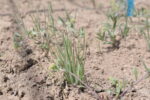 western.sare.org news restoring-rangeland-back-to-the-future
western.sare.org news restoring-rangeland-back-to-the-future Restoring Rangeland Back to the Future
Massive wildfires are on the rise throughout the West, reshaping plant communities and endangering native grasses that are a key source of forage for livestock. Reseeding with locally sourced seed is a common rangeland restoration strategy, but climate change raises an interesting question: What’s the best way to heal the land when its future environment […]
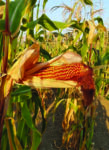 western.sare.org news researchers-work-to-develop-test-dry-farm-adapted-corn-varieties
western.sare.org news researchers-work-to-develop-test-dry-farm-adapted-corn-varieties Researchers Work to Develop, Test Dry-Farm-Adapted Corn Varieties
As farmers and agricultural researchers work to adapt to changing climatic conditions, some are looking to future innovations, some are exploring past agricultural practices, and some are doing both. In Western Oregon, a collaborative effort to establish and expand dry farming – growing crops without irrigation – is decidedly in the “doing both” camp. “There […]
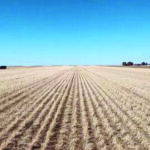 western.sare.org news experimenting-with-kernza
western.sare.org news experimenting-with-kernza Experimenting with Kernza
While some growers and researchers are experimenting with drought-adapted varieties of existing crops, others are testing more substantial shifts in agricultural practices. One of those shifts is from annual grain crops that have to be replanted every year to perennial grains that produce a crop year after year without replanting. In eastern Wyoming, a Western […]
 western.sare.org news switching-to-winter-crops-might-help-farmers-cope-with-warming-world
western.sare.org news switching-to-winter-crops-might-help-farmers-cope-with-warming-world Switching to Winter Crops Might Help Farmers Cope with Warming World
For people who grow food and cultivate the land, climate change isn’t something experienced though charts, graphs and predictions of foreboding futures. For growers, the threat of a warming world is immediate and increasing. “Climate change is playing out on farms like mine every day, every season and in every extreme weather event,” said Caitlin […]
 western.sare.org news reducing-weeds-by-80-using-solarization
western.sare.org news reducing-weeds-by-80-using-solarization Reducing Weeds by 80% Using Solarization
La Buena Tierra farmer Maria de los Angeles Carrillo (Angeles) is delighted that her interest in researching a non-chemical pest management practice has reduced her weeds by 80%. Coquillo (nutgrass) was the exception and even that stubborn grass has been reduced greatly and grows weaker roots. Lab tests also demonstrated reduced Verticillium wilt in the […]
Administrative Council Seeking Applications
The Administrative Council of the Western Sustainable Agriculture Research and Education program (Western SARE) is seeking applicants for qualified individuals for three positions representing either 1) non-government organizations, 2) agri-business, and 3) farmer/rancher on the Western SARE Administrative Council (AC). Learn More and Apply
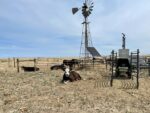 western.sare.org news the-quest-create-low-emission-cattle
western.sare.org news the-quest-create-low-emission-cattle The Quest: Create Low-Emission Cattle
As cows digest grasses and other cellulose-rich plants, microbes in their large first stomach – the rumen –break down the feed, releasing the potent greenhouse gas methane as a natural fermentation byproduct. Research is ongoing into seaweed and other additives to traditional forages to reduce methane production, creating low-emission feeds. But what if you created […]
Administrative Council Welcomes Alumni
Just because an Administrative Council Member’s term has ended, that doesn’t mean that they are no longer invested in the future of Western SARE and of agriculture in our region. For that reason, Western SARE has developed an “alumni” program and is reinvigorating it this year. The first step toward a re-energized alumni program took […]
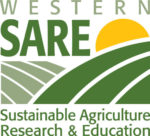 western.sare.org news recently-funded-projects
western.sare.org news recently-funded-projects Recently Funded Projects
Western SARE has funded 77 projects for 2023. These 77 projects totaled $7,363,082 in funding for six programs: Research and Education, Farmer-Rancher, Professional + Producer, Professional Development Program, Graduate Student Research & Education, and Research to Grassroots. Projects were funded in 14 states and protectorates. Example topic areas include: Overall, To review summaries of all […]